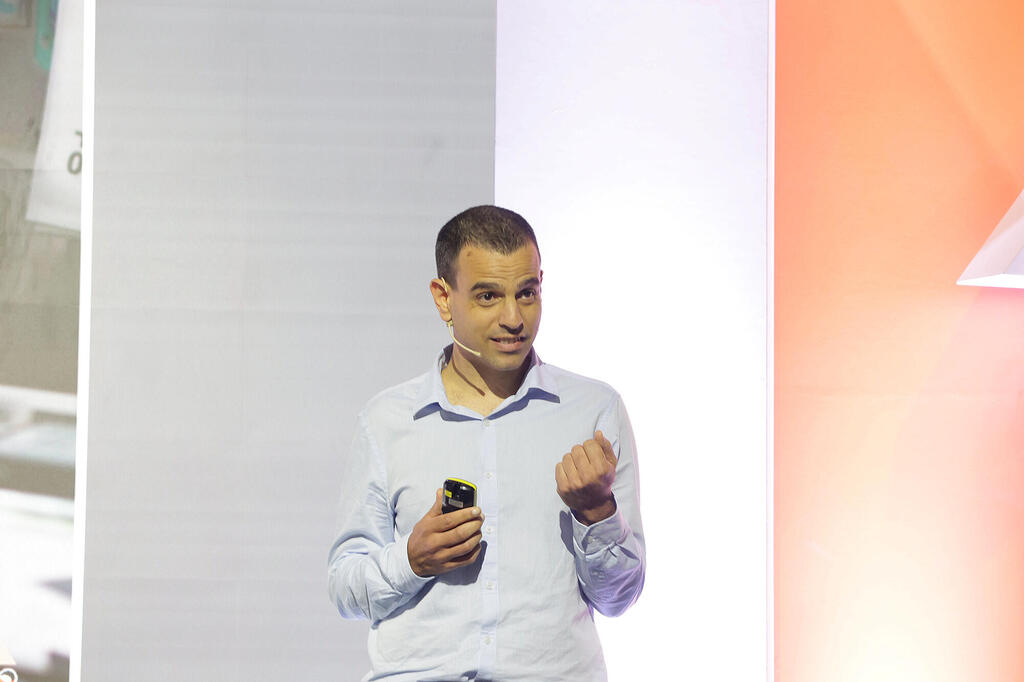
Optimism amid uncertainty: 68% of Israeli businesses expect a strong 2024
This figure, along with other data, comes from Mizrahi Tefahot Bank's growth index presented by Tomer Zelzer, Deputy Head of the Retail Division, at the Calcalist Growth Conference in collaboration with Mizrahi Tefahot.
46% of businesses in Israel are pessimistic about the state of the economy in the coming year. However, when business owners are asked about their situation, 68% claim that their situation in 2024 will be excellent. This figure, along with other interesting data, emerges from the growth index developed by Mizrahi Tefahot Bank economists and presented at Calcalist's Growth Conference in collaboration with Mizrahi Tefahot, by Tomer Zelzer, Deputy Head of the Retail Division at Mizrahi Tefahot.
"What is the source of this optimism?" he asked before explaining, "73% of the businesses believe their customer recruitment situation will not be harmed, and 83% think their ability to raise funds will not be harmed or might even increase."
Zelzer began by describing a small business for selling cell phone accessories, founded by a young man named Ziv Haimovitch and his brother in Shlomi in the north of Israel. According to Zelzer, "Shlomi was abandoned, and Ziv found himself with a business whose 13 employees were dispersed, some to the reserves, and he had to reinvent himself. They reached evacuees in Tiberias, Haifa, and Jerusalem to provide service and kept their customers. They also came to Shlomi twice a week to provide service to the soldiers there."
According to Zelzer, Haimovitch's private business exemplifies why Mizrahi Tefahot developed the bank's growth index. "Mizrahi CEO Moshe Larry and former Prime Minister Naftali Bennett emphasized the importance of high-tech in Israel, but private businesses are also critical—they are truly the heart of our economy. That's why we present an index showing growth from the perspective of private businesses essential to our economy."
According to Zelzer, a survey conducted by the bank among 500 businesses in various fields and gographic areas revealed that 99.5% of all businesses in Israel have a turnover of up to NIS 100 million. "60% of the workforce in Israel is in these businesses, contributing more than 50% to the economy's output."
Zelzer explained that the index consists of both economic and qualitative components. "We spoke to 500 businesses in a representative sample to understand their sentiment, and they have very interesting insights."
Zelzer then presented the index components, which include five elements. "The first component concerns the growth of the business product, which decreased by 8% in the fourth quarter during the war. In the first quarter, we increased by 4%, but this is still less than the first quarter of 2023. This means we are slightly increasing but need to grow much more."
"The second component concerns the growth of demand—credit card purchases increased significantly in the first quarter." The third component concerns the growth of the workforce: "Before the war, the economy was at full employment, but the recruitment of hundreds of thousands of reservists after October 7 increased the general unemployment rate. In the first quarter, we saw a significant decrease in unemployment and a shortage of workers."
The fourth component of the index concerns the growth in the number of businesses in Israel. "There is less good news here. While the number of businesses usually grows by 3% annually, in 2023, the growth was only 1.5%—it was halved." The fifth element concerns financing and the extent of credit.
"All these components make up the index, which was greatly affected by the war," said Zelzer. "We went back to 2017 to validate the index and ensure it accurately represents the economy from the businesses' perspective."
Zelzer presented the growth index ranging from 1 to 10 points, noting that the annual average is 6.5 points. "In the fourth quarter of last year, the growth index dropped to 3.5 points, but it rose to 5.2 points in the first quarter. This is an increase, but still below the long-term trend we aim for."
The second part of the survey, conducted with 500 business owners from various regions and fields, examined their thoughts and plans. "The average seniority of the businesses surveyed is 16 years, with 18% being young businesses with up to five years of operation. Only 50% of new businesses in Israel survive five years, and 23% employ more than 50 employees."
Regarding the impact of the war, Zelzer stated, "Almost a third of businesses report being significantly affected by the war, and 43% are in survival mode, operating at low intensity. We will see the results of this feedback in a year or two, and we need to find ways to change it."
Zelzer also noted that "50% of businesses in the sample are considering efficiency plans. Efficiency isn't necessarily bad, but when viewed as part of the responses from businesses, it's a red flag."
He observed that young businesses are more optimistic than older ones, and businesses in the north are more pessimistic. "However, we see that businesses in the south are recovering in terms of optimism, except for customer recruitment. This highlights the need to address the situation in the north."
Another troubling figure presented by Zelzer is that 40% of business owners said they only trust themselves. He addressed the audience, emphasizing the responsibility to choose small businesses as suppliers.
Concluding his remarks, Zelzer wondered about the future growth index. "We are at a critical juncture in decision-making. The decisions made will affect not only the Israeli economy but also each of the businesses that comprise it. I hope that businesses in the north that were evacuated will return to work in their natural locations, and we will see thriving communities."














